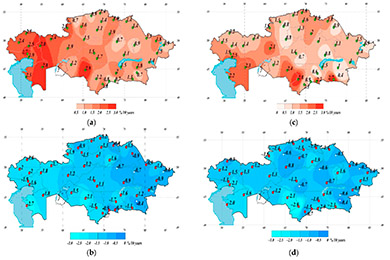The article presents the results of a study on the assessment of modern space–time trends of extreme values of air temperature and precipitation in 42 meteorological stations throughout Kazakhstan for the period from 1971 to 2020. Spatial and temporal analysis of the distribution of specialized climatic indices was recommended by the WMO climatology commission and an assessment of their trends was carried out. Spatial heterogeneity was revealed in terms of the degree of manifestation of changes and trends. Temperature indices are shown to confirm the overall warming trend. The division of the territory of Kazakhstan by the degree of manifestation of climate change into the southwestern and northeastern half was revealed. Extreme trends are most pronounced in the southwestern half, where a significant trend has been identified both for an increase in extremely high daytime and extremely low night temperatures. The calculated trends in temperature indices are generally significant, but the significance is mainly not ubiquitous; the trends are significant only in certain parts of Kazakhstan. WSDI and CSDI trends were found to confirm a widespread increase in the overall duration of heat waves and a reduction in the overall duration of cold waves. No significant extreme effects were found in the sediments. It is confirmed that Kazakhstan has weak, statistically insignificant, positive and negative trends in the maximum duration of the non-traveling period. Precipitation index trends, unlike temperature ones, are statistically insignificant in most of the country.
An Assessment of the Present Trends in Temperature and Precipitation Extremes in Kazakhstan

